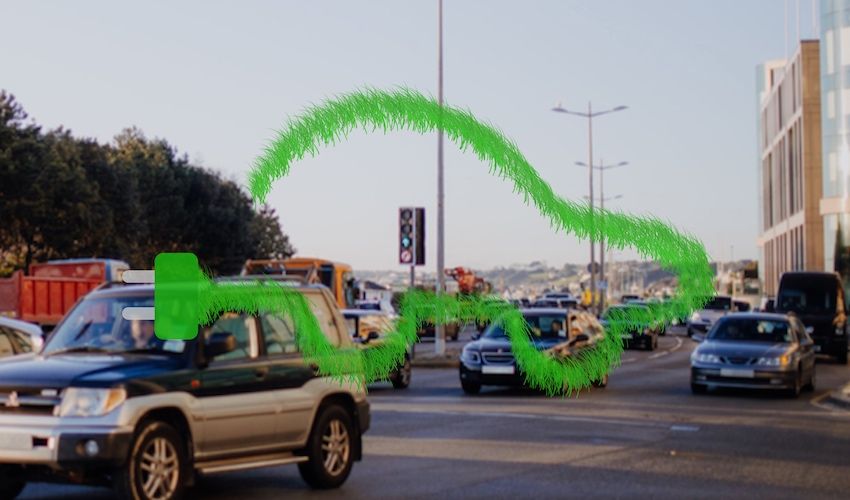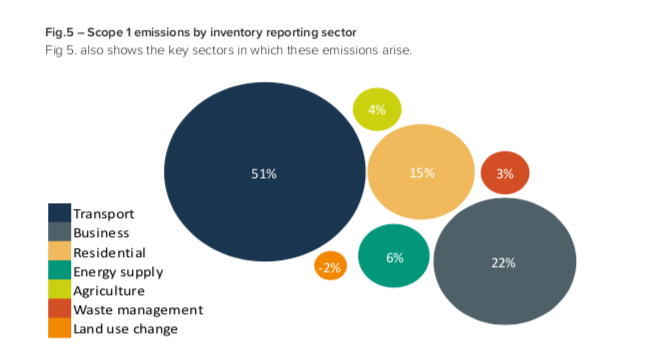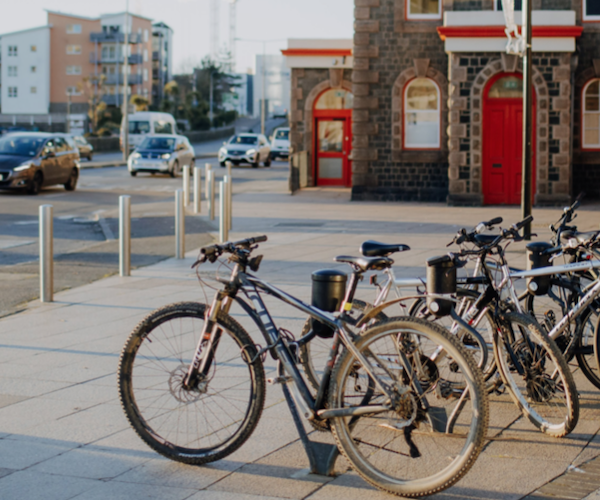


‘Green diesel’ is being imported to power the government's vehicle fleet and the island's buses as part of new proposals to make Jersey's transport system more sustainable.
The ‘bio-fuel’ pilot scheme was revealed yesterday as the Infrastructure Department officially launched its Sustainable Transport Policy, which includes ambitious proposals to move islanders away from petrol or diesel vehicles, and towards greener alternatives.
As the island prepares to fulfil its commitment to achieve net-zero carbon emissions by 2030, the department is setting its sights on Jersey’s biggest polluter – transport.
The policy includes outline plans for a mass cultural change in Jersey, which enables islanders to retain choice over how they get around, whilst also considering the environment.

Pictured: Jersey's top sources of carbon emissions.
It's divided into two parts – the first dealing with bigger-picture ideas for how transport will change over the next decade, and the second looking at short-term plans which its hoped will come into effect this year.
Speaking to Express about the pilot scheme, Infrastructure Minister Deputy Kevin Lewis cited the green diesel trial as one of the “concrete things” that the policy document promises.
“Concrete things are happening, because within the next thirty years it will be impossible to buy a car unless it’s electric because the car manufacturers in the UK and indeed Europe will stop making them – so you’ll have to have an electric car. But we’re way down the line from that.”
“In the short-term if somebody has a diesel car which can be polluting, we’re actually going to be importing special green diesel which is non-polluting. It’s a bio-diesel which will solve the problem in the short-term."
He explained that buses and Government vehicles will be using this bio-fuel.
When asked for more detail on the nature of this fuel, the Minister could not name the fuel or its source: “It is bio-diesel. It’s being checked at the moment by officers, but the reports [are] coming back saying it’s very good quality and it is from a sustainable source.”
Elsewhere in the plans, the Minister spoke of extending cycle routes out to the East of the island and creating a cycling ‘hub’ where that new route meets its western counterpart.

Pictured: One of the Government's short-term goals is extending cycle routes through to the east of the island.
“There’s so much we can do with improving cycle facilities. Obviously we inherited the western cycle route which is the old Railway Walk. We need to expand that to go to the East which we’re basically starting from scratch so we have to really move forward with that.
“Where it meets in the middle, we want to bring in the short-term, more routes into town itself so people can cycle from east or west, cycle into town and have a cycling ‘hub’ right in the middle of town so people can leave their bikes in safety in a secure area and under cover.”
As part of plans the department are starting this year, Deputy Lewis also spoke of creating bus lanes to cut out congestion and journey times on the island’s main bus routes and increasing the number of shelters to make taking public transport “more pleasurable".
Despite having previously raised concerns about departmental staffing shortages following his department's absorption into the ‘super department’ of Growth, Housing and Environment, Deputy Lewis denied that Infrastructure was biting off more than it could chew.
“...Most of it is about changing modes of transport, but these are relatively small steps. They’re not huge projects in themselves, but the impact will be huge… A lot of this is about policy, not necessarily about infrastructure.”
On electric vehicles, the Minister said that the carbon-neutral 2030 commitment is “an extra burden and time pressure."
He continued: “As long as we phase out petrol and diesel cars before the UK and Europe, that would be good, because we don’t want to become a ‘dumping ground’ for vehicles that they can’t sell. So we will be moving with the times, but not necessarily ahead of it.”
Following statistical projections that price hikes on fuel duty affect Jersey’s lowest earners the most, Deputy Lewis also made assurances that the island’s poorest won’t be the ones left saddling the bill for delivering sustainable transport.
“I’m not into punishing people; I’m into enabling people to make that change. But maybe further down the line we can actually possibly bring in government grants to assist in buying electric or hybrid vehicles.”
Comments
Comments on this story express the views of the commentator only, not Bailiwick Publishing. We are unable to guarantee the accuracy of any of those comments.